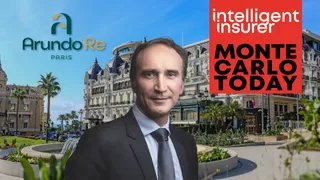
Rising risks drive reinsurance demand, pricing discipline crucial: Arundo Re
With risks rising faster than ever and capacity available, reinsurers cannot afford to lose sight of the fundamentals, warns Laurent Montador, deputy chief executive officer of Arundo Re, who told Monte Carlo Today the ‘real’ conversation must be about capacity needed and protection against the next shock. “Talks will focus on lower premiums and flexible pricing. But cedents need additional capacity, risks are rising and black swan scenarios can happen. It is vital to stay covered.”
Key points:
‘Black Swan’ threats loom large
Capacity and innovation critical as risks grow
Systemic risks need public–private answer
That warning reflects the delicate balance facing the market; after two years of healthier returns, there is some scope for softening but rising exposures mean reinsurers must hold their discipline. “There was a reset of conditions in 2023 after a decade of inadequate returns on equity for the sector,” Montador said. “The returns since 2023 have so far been good, so there is scope for some softening. But we are still facing high nat cat losses, inflationary pressures and social inflation, which is a concern.”
“Insurers are keen to cede more business, but reinsurers will only back those with strong data, transparent risk management and a solid loss record.”
The implication, he said, was that reinsurers couldn’t afford to swing too far back towards softer structures. After years of “underpriced aggregates and too low bottom layers", programmes with higher retentions are here to stay. “We want to avoid going back to the days when there were many opaque aggregate covers that were difficult to model. That will keep structure as a theme.”
Montador insisted that “reinsurers will have to preserve their discipline”. While some flexibility on price is likely, he emphasised it would not be cheap capacity. “Insurers are keen to cede more business, but reinsurers will only back those with strong data, transparent risk management and a solid loss record.”
That discipline is particularly critical in casualty and specialty lines, where reserve adequacy is still under scrutiny. “Lessons from the past 10 years must be taken seriously, and we need to pay close attention to reserve adequacy,” he said. Multi-year solutions and better use of ILS could be part of the toolkit, but only if coverage clarity is maintained.
Asked about the right role for public-private partnerships, Montador argued that systemic risks could not be managed by the State alone “When we talk about systemic risk, it’s pandemics, cyber-attacks, climate-related catastrophes or geopolitical shocks and in different manners, the State intervenes.
“Insurance and reinsurance are part of the solution of course,” he said. But for too extreme events with domino effects, public-private partnerships are essential - with State intervention to make cover available for mutualisation, claims management and innovation from the private sector - and with potential State backstops to avoid lack of capacity under specific extraordinary situations.
Examples already exist, Montador noted, from Pool Re in the UK to TRIP (Terrorism Risk Insurance Program) in the US, with discussions also ongoing in Europe. “The solution has to involve the private sector and only above a certain threshold should public forces step in,” he said. Cyber in particular might exceed the capacity of private carriers, making regulatory involvement inevitable.
Regulation more broadly is reshaping the global landscape. Montador pointed to Solvency II and similar regimes, ESG reporting and new rules on cyber resilience and AI. These frameworks are both burdensome and protective.
“Regulation is becoming a central force in the reinsurance industry, influencing capital deployment and product design,” he commented.
Asked whether capital, talent or technology mattered most, Montador was clear: all three were essential. “Reinsurance is still a business built on trust and financial strength and adequate capital is non-negotiable,” he explained. But talent is equally vital as a differentiator: “It is still a people business and there is always competition to attract and retain the best.”
Technology, however, might be the real game-changer. “We are convinced that AI and big data are changing the rules of the game and we’re preparing our workforce to adapt and proactively use these technologies.”
For Arundo Re, it’s all about stability and growth. “We are a medium-sized company and our aim is to continue building on our three-year plan. Last year we achieved very strong turnover, this year we are on track for double-digit growth and remain adequately profitable.”
With an undiscounted combined ratio slightly above 90% and strong shareholders support confirmed following CCR’s exit, Montador said the company is “well prepared for the renewal and ready to reinforce its links with existing clients and to structure new deals with new partners.”
Laurent Montador is the deputy chief executive officer of Arundo Re. He can be reached at: lmontador@arundore.com
For more news from Monte Carlo Today, click here.
Did you get value from this story? Sign up to our free daily newsletters and get stories like this sent straight to your inbox.
Editor's picks
Editor's picks
More articles
Copyright © intelligentinsurer.com 2024 | Headless Content Management with Blaze

